
The lauburu is an ancient hooked cross with four comma-shaped heads and the most widely known traditional symbol of the Basque Country and the Basque people. In the past, it has also been associated with the Galicians, Illyrians and Asturians.

Ahetze is a village and a commune in the Pyrénées-Atlantiques department in the Nouvelle-Aquitaine region in southwestern France. The commune is part of the urban area of Bayonne, and of the traditional Basque province of Labourd.

Ayherre is a commune in the Pyrénées-Atlantiques department in the Nouvelle-Aquitaine region of south-western France.
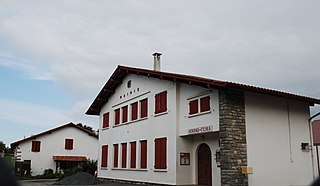
Armendarits is a commune in the Pyrénées-Atlantiques department in the Nouvelle-Aquitaine region of south-western France.
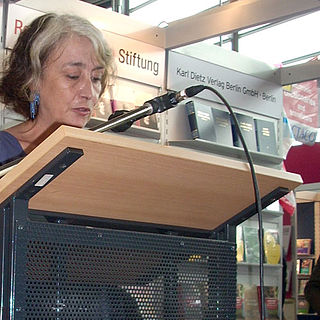
Arantxa Urretabizkaia Bejarano is a contemporary Basque writer, screenwriter and actress. She was born in Donostia-San Sebastián, Guipúzcoa, País Vasco.
Joan Antonio Mogel Urkiza (1745–1804) was a Basque writer of the 18th century and author of one of the most important pieces of Basque classical literature, Peru Abarka, the first novel written in that language. Finished by the author in 1782, this book was not published until 1880 — in installments that came out in a newspaper. In 1881, it was published as a book for the first time.

José Luis Álvarez Enparantza, better known by his pseudonym Txillardegi, was a Basque linguist, politician, and writer. He was born and raised in the Basque Country, and although he did not learn the Basque language until the age of 17, he later came to be considered one of the most influential figures in Basque nationalism and culture in the second half of the 20th century. He was one of the founders of ETA, but in 1967 he left because he did not agree with its political line.
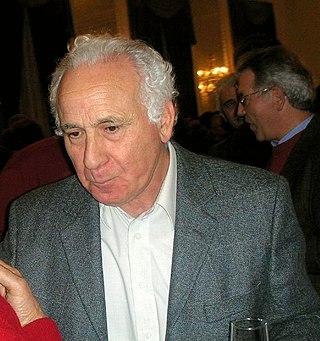
Joxe Azurmendi Otaegi is a Basque writer, philosopher, essayist and poet. He has published numerous articles and books on ethics, politics, the philosophy of language, technique, Basque literature and philosophy in general.
Twist is a 2011 crime novel, with elements of political thriller, written by Basque writer Harkaitz Cano. The book won the 2012 Basque Literature Prize. The original Basque version was published by the Editorial Susa in 2011, Gerardo Markuleta translated the novel to Spanish and it was published by Seix Barral in 2013. The English translation by Amaia Gabantxo was published in 2018 by Archipelago Books.
Koldo Izagirre Urreaga is an innovative Basque writer who has worked in several genres of literature, including poetry, novels, and tales. Izagirre has translated works by classic authors into other languages. He has also written texts, both for young people and adults. In addition, he has produced journal and magazine articles, and written television and film scripts.
Tomas Agirre Lekube, was a footballer from Bilbao in the Basque Country in northern Spain, who played as a midfielder.
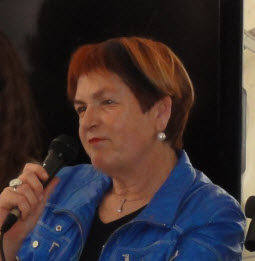
Mariasun Landa Etxebeste is a Spanish writer. Most of her literary production has been developed in the Basque language in the field of children's and young people's literature. She is one of the writers in Basque language more translated to other languages.

Maialen Lujanbio is a Basque poet and bertsolari winner. She composes her oral poetry in the Basque language and she is the only woman to ever reach her level.

Women in the Basque Nationalist Party in Francoist Spain were involved in leadership positions from an early period. The Basque Nationalist Party (PNV) was founded prior to the Second Spanish Republic in Bilbao, as a conservative Roman Catholic organization. They initially tried to be neutral during the Civil War, but later more openly opposed Nationalist forces. This led to repression and investigation after the war of women PNV members, and wives and daughters of male PNV members. Emakume Abertzale Batza, PNV's women political section, was operated in exile in this early period.
Javier Vicente Manso de Velasco was a politician, nationalist, and the son of Manuel Maria Vicente. He was an industrialist and a member of the Basque Nationalist Party, and founded the Euzkadi newspaper in 1913, together with Jose Maria Goia and Luis Arroyo. He founded and directed the nationalist association Juventud Vasca in Bilbao (1912–1916). He was one of the promoters in 1918, and was involved in the creation of the newspapers Excelsior and La Tarde. As a result of the 1936 war, he moved to Lapurdi and represented the Basque Government in Bayonne in the years 1940 to 1959.

The Auñamendi Encyclopedia is the largest encyclopedia of Basque culture and society, with 120,000 articles and more than 67,000 images.
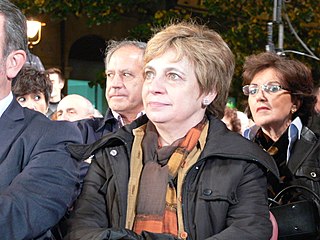
Miren Karmele Azkarate Villar is a politician, professor of Basque philology, university lecturer and full member of the Royal Academy of the Basque Language. She was Minister of Culture and spokesperson for the Basque Government.

Carmen Gal Orendain, better known as Menchu Gal, was a Spanish painter from the Basque Country. Her work in landscapes and portraits made her famous with her personal attraction to vivid colors. In 1959, she became the first woman to be awarded Spain's National Painting Prize.

Uxue Alberdi Estibaritz is a Basque writer and bertsolari.

Idoia Estornés Zubizarreta is a Chilean-born Spanish historian and writer. She was honored with the "Premio Literario de Ensayo Euskadi" in 1988 and the Premios Euskadi de Literatura in 2014.













